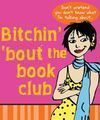 Here's a query from the mailbag—from a reader who has a fairly common book club issue.
Here's a query from the mailbag—from a reader who has a fairly common book club issue.
What do you do with members who stray from the book and talk about…well, whatever comes to mind? We have a couple of members, one in particular, who can't stay focused on the discussion.
This is not an unusual problem for a good many book clubs. A fair amount of socializing is expected...and desireable...but not when it gets in the way of a potentially rich book discussion. Here are some approaches:
1. Delineate social time from book discussion time.
- Set a strict time limit for socializing—say, 45-60 minutes. Then….ring a bell… make an announcement…clear away food dishes…move to a different room.
2. Keep it light-hearted
- Turn it into a game. Whoever talks off topic gets a token—a poker chip, a pebble, a raw potato, a burnt candle nub…whatever. The person with the most tokens at the end of the meeting—or year—wins a booby prize.
3. Survey member expectations
- Discuss among yourselves what you want out of your club—more social interaction or book discussion. If members are divided, then perhaps you need separate clubs. It should be done without rancor or hurt feelings. Everyone has different expectations. It’s life.
Other ideas? We’d love to hear from you.
 Here's a query that showed up in my mailbox recently. It's a common problem for a lot of book clubs—The Dominator.
Here's a query that showed up in my mailbox recently. It's a common problem for a lot of book clubs—The Dominator.
How do you handle a member who tends to dominate the book discussion? We have someone who hogs the conversation. Worse, she always feels free to interrupt others.
This is by far the toughest problem facing any book club...and one with no easy solution. Still, here are a few approaches to try:
1. Use a special token. Pass an object—a branch, painted stone, or small pillow, say—around the room. ONLY the member who holds the token may talk. Those who aren’t holding the token cannot interrupt. You could even limit the number of times a person can hold the token. (I personally don’t like the token method, but groups who use it say it works.)
2. Limit comment time. Use a timer to restrict comments. No one should talk more than two (2) minutes for openers—and certainly no more than one (1) minute to comment on someone else’s ideas. The goal for all is to learn to talk succinctly so that there’s time for everyone to voice an opinion.
3. Take charge of the discussion. The leader can interject with comments like, “Great, Bill. Thanks. But let’s give others a chance” or “Can we hear from someone else?” or “What do the rest of you think” or “Mary, you haven’t said anything.” It takes an active, fairly skilled, leader to move the discussion from one person to another, without letting a single individual dominate. It’s not easy.
4. When all else fails…be direct.
• Initiate a one-on-one conversation, either face-to-face or by phone—never, never by email or text. Be sure to choose someone who's diplomatic.
• What to say? Assure the person that he/she is a valued member of the club, but some feel they don’t get to have their ideas heard...or that while the group appreciates the person’s insights, there’s a tendency to over-do. Ask him or her to give others a chance...or not to interject so frequently...or to limit the length of his/her comments.
• The worst case scenario is to ask the offending member to leave the group. This is painful, but for the sake of the overall group it may be necessary. If the problem isn’t resolved, members may start dropping out and finding other groups. Suggest—kindly—that the member move on.
Is this a problem in your club? Any suggestions?
 I get some interesting emails—many are about problems a lot of book clubs face. Here’s one I got recently:
I get some interesting emails—many are about problems a lot of book clubs face. Here’s one I got recently:
What do you do with members who haven’t read the book…but who still love to talk and talk as if they have? Should clubs have rules that say if you haven't read the book, you can't come to the meeting?
Set some guidelines at the outset
At the beginning of every book discussion, the host or discussion leader should ask if all members can agree to the following propositions:
• It is realistic—not everyone can read every book; we all have busy lives. Therefore, non-readers should always feel welcome to attend.
• As a matter of fairness—those who have read the book should get first dibs on talking about it.
•As a matter of courtesy—it’s incumbent on non-readers to LISTEN and comment briefly or rarely.
Any other ideas? Here’s the spot to share them.
 This article in the New York Times dishes out some pretty good gossip on book clubs—it turns out, not everyone’s thrilled about the club they belong to. No! Really?
This article in the New York Times dishes out some pretty good gossip on book clubs—it turns out, not everyone’s thrilled about the club they belong to. No! Really?
Come on—didn’t we learn way back in childhood the maxim, ”you can’t please all the people all the time”? Why would book clubs be an exception? —
Common complaints
Book Selections. Not everyone likes the reading list. Some like classics, some chick-lit; others nonfiction or sci-fi. It’s not easy to satisfy divergent tastes.
Discussions Problems. Some members complain about too much socializing or a lack of substance; others feel the discussions are too academic, taking the fun out the whole exercise.
Hosting Competition. Hosting can become a game of one-upmanship—so much so that some members put hosting right at the top of their stress index. Where’s the fun in that?
Some advice
If you’re starting a club, set some guidelines at the outset about the types of books you want to read and the nature of discussions. (See LitLovers tips on How to Start a Book Club.)
If you’re in an existing club, conduct a survey, formal or informal, to find out if your club is meeting members’ expectations. What types of books do members like? What kind of discussions? How much time devoted to social vs. book talk? What kind of food and who cooks?
If you’re one of the unhappy ones, feel free to move on without too much guilt…and without too many hurt feelings. You might simply tell your members that you want to try a different approach. Nonetheless, no matter how diplomatic everyone is, leaving is always hard. But be brave.
